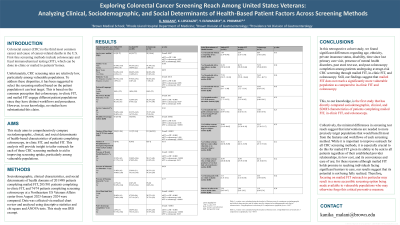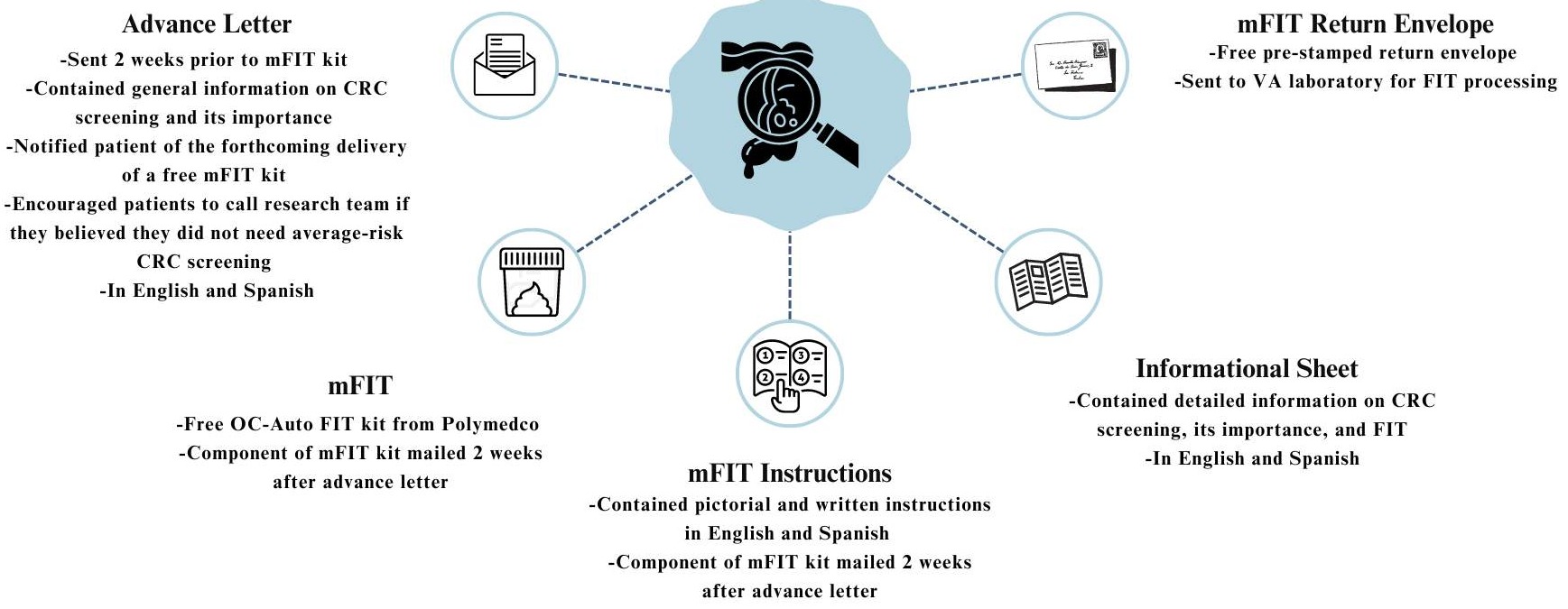Tuesday Poster Session
Category: Colorectal Cancer Prevention
P3856 - Exploring Reach of Colorectal Cancer Screening Methods: A Comparison of Clinical and Sociodemographic Factors Among Patients Completing Mailed FIT vs In-Clinic FIT
Tuesday, October 29, 2024
10:30 AM - 4:00 PM ET
Location: Exhibit Hall E

Has Audio

Kanika Malani, BS
The Warren Alpert Medical School of Brown University
Providence, RI
Presenting Author(s)
Kanika Malani, BS1, Kirsten Loscalzo, MD2, Yousef Elfanagely, MD2, Kittichai Promrat, MD2
1The Warren Alpert Medical School of Brown University, Providence, RI; 2Brown University, Providence, RI
Introduction: Colorectal cancer (CRC) is the third most commonly diagnosed cancer and cause of cancer-related mortality in the United States. Preventive screening allows early detection of CRC, but screening rates are low, especially among at-risk populations. One increasingly implemented first-line CRC screening method is fecal immunochemical testing (FIT). FIT can be provided to a patient using two approaches, each with its own unique workflow: during a clinic visit (in-clinic FIT) or by direct mailing to a patient's home (mailed FIT). As compared to traditional in-clinic FIT, the newer mailed FIT addresses barriers to care at multiple levels, including eliminating the need to have a doctor, schedule a doctor's appointment, or arrange transportation to and from a clinic. These characteristics have resulted in the common belief that mailed FIT engages a distinct and more vulnerable patient population as compared to traditional in-clinic FIT. However, no study has validated this belief. This study aims to compare the patient populations reached via mailed FIT vs in-clinic FIT.
Methods: Sociodemographic and clinical characteristics of 201/498 patients completing mailed FIT and 203/501 patients completing in-clinic FIT at a Northeastern US Veterans Affairs center from August 2023-January 2024 were compared. Data was collected via medical chart review and analyzed using descriptive statistics and chi square and ANOVA tests. This study was IRB exempt.
Results: No significant differences (p≥0.05) were found between patients completing mailed FIT vs in-clinic FIT when evaluating the following: age, gender, race, ethnicity, preferred language, service connected status, disability, number of emergency department visits and hospitalizations in 2023, presence of substance use disorders, and housing insecurity. Mailed FIT patients had significantly more private health insurance (p< 0.0001) and more time elapsed since their last primary care visit (p=0.000). In-clinic FIT patients had significantly more mental health disorders (p< 0.0001), use of past stool tests (p< 0.00001), and past colonoscopy completion (p< 0.00001).
Discussion: Mailed FIT has the potential to engage patients facing increased barriers to care in CRC screening. However, our findings suggest that mailed FIT does not reach a significantly more vulnerable population as compared to traditional in-clinic FIT. As such, targeted interventions are needed to improve mailed FIT outreach, and in turn, CRC screening rates.

Note: The table for this abstract can be viewed in the ePoster Gallery section of the ACG 2024 ePoster Site or in The American Journal of Gastroenterology's abstract supplement issue, both of which will be available starting October 27, 2024.
Disclosures:
Kanika Malani, BS1, Kirsten Loscalzo, MD2, Yousef Elfanagely, MD2, Kittichai Promrat, MD2. P3856 - Exploring Reach of Colorectal Cancer Screening Methods: A Comparison of Clinical and Sociodemographic Factors Among Patients Completing Mailed FIT vs In-Clinic FIT, ACG 2024 Annual Scientific Meeting Abstracts. Philadelphia, PA: American College of Gastroenterology.
1The Warren Alpert Medical School of Brown University, Providence, RI; 2Brown University, Providence, RI
Introduction: Colorectal cancer (CRC) is the third most commonly diagnosed cancer and cause of cancer-related mortality in the United States. Preventive screening allows early detection of CRC, but screening rates are low, especially among at-risk populations. One increasingly implemented first-line CRC screening method is fecal immunochemical testing (FIT). FIT can be provided to a patient using two approaches, each with its own unique workflow: during a clinic visit (in-clinic FIT) or by direct mailing to a patient's home (mailed FIT). As compared to traditional in-clinic FIT, the newer mailed FIT addresses barriers to care at multiple levels, including eliminating the need to have a doctor, schedule a doctor's appointment, or arrange transportation to and from a clinic. These characteristics have resulted in the common belief that mailed FIT engages a distinct and more vulnerable patient population as compared to traditional in-clinic FIT. However, no study has validated this belief. This study aims to compare the patient populations reached via mailed FIT vs in-clinic FIT.
Methods: Sociodemographic and clinical characteristics of 201/498 patients completing mailed FIT and 203/501 patients completing in-clinic FIT at a Northeastern US Veterans Affairs center from August 2023-January 2024 were compared. Data was collected via medical chart review and analyzed using descriptive statistics and chi square and ANOVA tests. This study was IRB exempt.
Results: No significant differences (p≥0.05) were found between patients completing mailed FIT vs in-clinic FIT when evaluating the following: age, gender, race, ethnicity, preferred language, service connected status, disability, number of emergency department visits and hospitalizations in 2023, presence of substance use disorders, and housing insecurity. Mailed FIT patients had significantly more private health insurance (p< 0.0001) and more time elapsed since their last primary care visit (p=0.000). In-clinic FIT patients had significantly more mental health disorders (p< 0.0001), use of past stool tests (p< 0.00001), and past colonoscopy completion (p< 0.00001).
Discussion: Mailed FIT has the potential to engage patients facing increased barriers to care in CRC screening. However, our findings suggest that mailed FIT does not reach a significantly more vulnerable population as compared to traditional in-clinic FIT. As such, targeted interventions are needed to improve mailed FIT outreach, and in turn, CRC screening rates.

Figure: Title: Components of the Mailed Fecal Immunochemical Testing Workflow
This describes components of the mailed fecal immunochemical test (mFIT) workflow, including mailing a bilingual advance notification letter followed by send-out of an mFIT kit containing FIT, bilingual FIT instructions and educational sheet, and free FIT return envelope. If mFIT is not returned within one month following FIT send-out, patients are sent reminders to complete screening using this method. Once mFIT is completed, patients are sent result letters containing follow-up recommendations. If mFIT results are abnormal, patients are also called personally for discussion and scheduling of follow-up colonoscopy.
mFIT, mailed fecal immunochemical testing
CRC, colorectal cancer
VA, Veterans Affairs
This describes components of the mailed fecal immunochemical test (mFIT) workflow, including mailing a bilingual advance notification letter followed by send-out of an mFIT kit containing FIT, bilingual FIT instructions and educational sheet, and free FIT return envelope. If mFIT is not returned within one month following FIT send-out, patients are sent reminders to complete screening using this method. Once mFIT is completed, patients are sent result letters containing follow-up recommendations. If mFIT results are abnormal, patients are also called personally for discussion and scheduling of follow-up colonoscopy.
mFIT, mailed fecal immunochemical testing
CRC, colorectal cancer
VA, Veterans Affairs
Note: The table for this abstract can be viewed in the ePoster Gallery section of the ACG 2024 ePoster Site or in The American Journal of Gastroenterology's abstract supplement issue, both of which will be available starting October 27, 2024.
Disclosures:
Kanika Malani indicated no relevant financial relationships.
Kirsten Loscalzo indicated no relevant financial relationships.
Yousef Elfanagely indicated no relevant financial relationships.
Kittichai Promrat indicated no relevant financial relationships.
Kanika Malani, BS1, Kirsten Loscalzo, MD2, Yousef Elfanagely, MD2, Kittichai Promrat, MD2. P3856 - Exploring Reach of Colorectal Cancer Screening Methods: A Comparison of Clinical and Sociodemographic Factors Among Patients Completing Mailed FIT vs In-Clinic FIT, ACG 2024 Annual Scientific Meeting Abstracts. Philadelphia, PA: American College of Gastroenterology.
